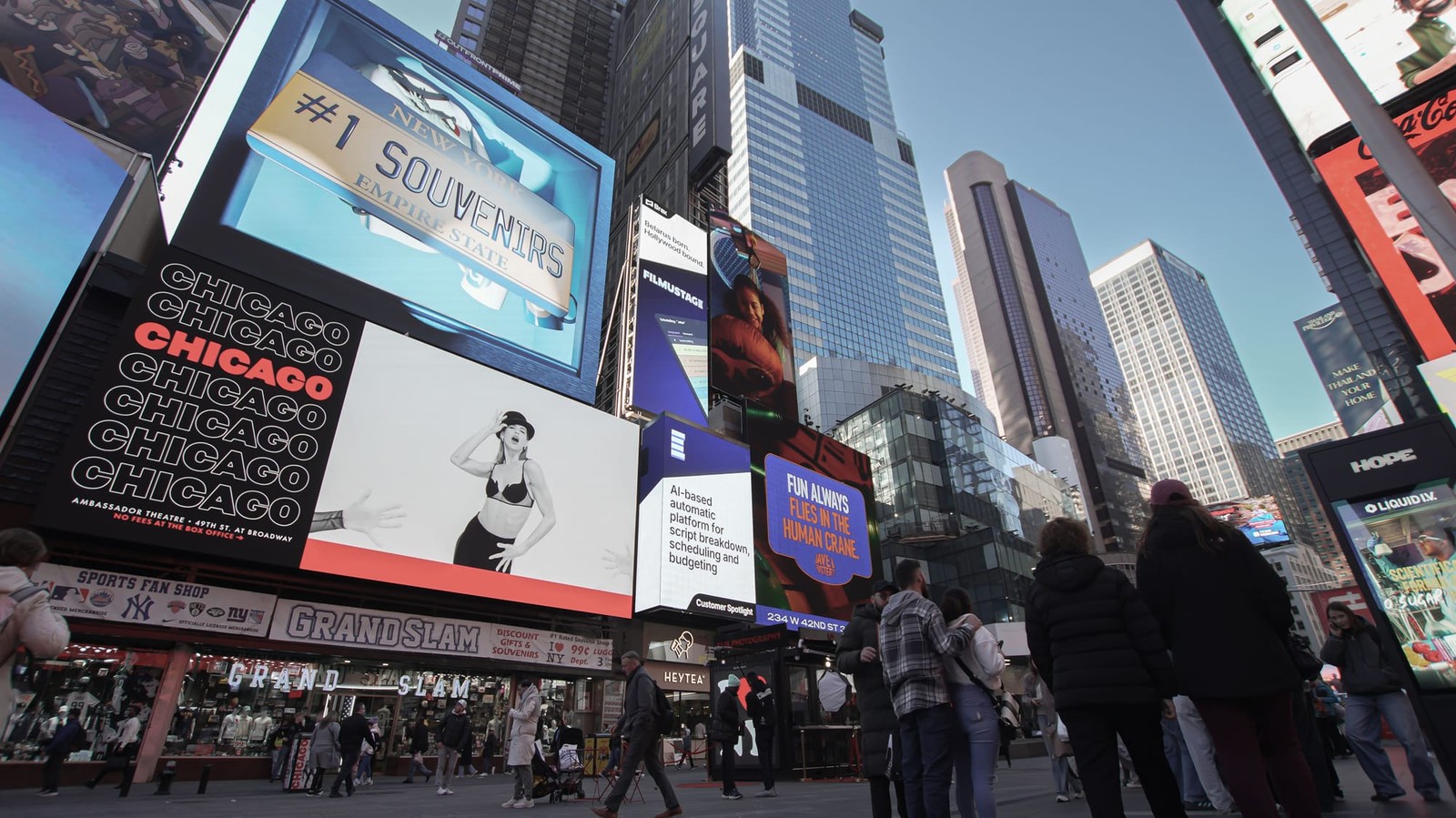“Belarus Born. Hollywood Bound”: Filmustage and Belarus on the Brightest Screens — from John Wick to Times Square
From compelling storylines to cutting-edge software, Belarus has made a curious, creative, and often overlooked impact on the film industry.


In the very heart of Manhattan, among flickering ads for global banks, Silicon Valley darlings, and movie trailers, one billboard quietly told a different story:
“Belarus born. Hollywood bound.”
It wasn’t just an ad — it was a loud premiere on the world’s most visible stage. Filmustage, an AI-powered pre-production platform founded by a Belarusian team, had made it to Times Square — not as part of a film, but as a bold new player in the industry that defines them.
🎥 Watch the short video we created to mark the moment.
It begins with a familiar line from John Wick and ends with our message lighting up Times Square.
It wasn’t just a billboard. It was a statement — bold, personal, and unmistakably intentional. A country long cast in the shadows of spy thrillers and Cold War dramas was now stepping into the frame on its own terms, in the world’s most iconic media space.
To mark the moment, we created a short video — and instead of starting with logos or product shots, we opened with a line from John Wick: Chapter 3 – Parabellum:
“My name is Jardani Jovanovich. I am a child of Belarus.”
In the movie, it’s a plea for sanctuary. In this context, it became something else entirely — a reclamation of origin. A subtle reminder that the most iconic action antihero of our time has Belarus in his bones.
Wick’s story — brutal, disciplined, mythic — traces back to the Ruska Roma, a Belarusian-slavic syndicate that raised him in the shadows. His words echo with the weight of identity:
“I am a child of Belarus. I ask you for your help.”
That line, and that origin, flipped something in us. Belarus is often reduced to a gray blur in Western pop culture — a place for spies, secrets, and accents that all sound vaguely villainous. But what if it could be more?
This billboard was our answer.





Hollywood has glanced eastward many times — sometimes strange, sometimes funny, sometimes eerily accurate. Let’s rewind and take a closer look at how Belarus has appeared on screen — and how the narrative is finally starting to shift.
🛂 "The Terminal": Gomel in Krakozhia
In "The Terminal" (2004), Tom Hanks plays Viktor Navorski, a man stranded at JFK Airport after a coup in his fictional country, Krakozhia. But eagle-eyed viewers spotted something real — his driver’s license is Belarusian, listing Gomel as his place of residence.
The document belongs to a real woman, Gulnara Gulina, who emigrated to the U.S. from Belarus in the 1990s. So while Krakozhia may not exist, its cinematic soul seems to have a very real Belarusian heartbeat.

👨🔬 "Friends": “He’s in Minsk… in Russia?”
One of the most iconic American sitcoms of all time, "Friends" (1994 - 2004) follows six twenty-somethings navigating life, love, and careers in New York City. Over its ten-season run, the show became a cultural phenomenon — and even it managed to sneak in a (confused) reference to Belarus.
Phoebe’s boyfriend David gets a research grant to work in Minsk. When he breaks the news, the gang reacts with confused sympathy — especially after he clarifies that “Minsk… is in Russia.”
Of course, it’s not. Minsk is the capital of Belarus, and this misplacement is a running gag that unintentionally reveals how little American audiences (and writers) knew about post-Soviet geography in the 1990s.
David later describes the city as full of Lenin statues, farewell rituals, and spring fairs — a mix of cliché and creative fiction.
Ironically, the real connection is much more accurate: Lisa Kudrow’s paternal ancestors came from Belarus, specifically the village of Ilya near Vileyka. In 2008, she visited her ancestral home to film a documentary about her family history and the Jewish community that was tragically lost during WWII.
🧠 "Sherlock (BBC)": “Just a domestic. In Belarus.”
The modern reboot of Sherlock Holmes by the BBC brought Arthur Conan Doyle’s legendary detective into 21st-century London — complete with smartphones, sharp wit, and global intrigue. But in the very first episode, Sherlock makes an unexpected detour… to Belarus.
The scene opens in a grim Eastern European prison. Sherlock is interviewing a desperate inmate who speaks broken English, pleading his innocence. Watson later asks about “the case in Russia,” and Sherlock casually corrects him:
“Belarus. Just a domestic. Not worth my time.”

It’s brief, but the Belarusian flag is on the wall and the name is said clearly — no longer lost in a Soviet blur.
🧛♂️ "Harry Potter": Vampires in Minsk
The Harry Potter universe spans far beyond Hogwarts — from dragon reserves in Romania to wizarding banks in London. But buried within Hagrid’s offhand travel tales lies a surprising nod to Belarus.
In "Harry Portter andThe Half-Blood Prince" (2009), Hagrid returns from one of his typically chaotic journeys and casually mentions:
“Had a bit of trouble with a vampire in a tavern in Minsk.”
It’s a single line — but it officially places Minsk on the wizarding world map. Alongside giants in the mountains and trolls near the Polish border, Belarus emerges as part of J.K. Rowling’s magical geography — gritty, distant, and just a little dangerous. A brief mention, but one that sticks.
🧳 "Supernatural": Forests and Golems in Vitebsk
In a series packed with demons, angels, and apocalypses, "Supernatural" (2005-2020) still found time to mention Belarus — and not just once. In an early episode, the angel Castiel saves the Winchester brothers by teleporting them to a dark, snowy forest, where they’re informed they’re in Belarus. Cue the wolves, the mist, and the sense of danger.
Later, a more substantial reference takes viewers to Vitebsk, 1944, in a WWII-era plot involving a Jewish golem and Nazi occultists. The architecture is suspiciously un-Belarusian, and it’s all filmed in darkness, but the intent to ground the story in Belarusian history is clear — a rare gesture in genre TV.
💣 "Agents of S.H.I.E.L.D.": Zloda, Belarus
Marvel’s "Agents of S.H.I.E.L.D." (Season 1, Episode 3 – “The Asset”, 2013) sends its characters around the world — including, unexpectedly, to Zloda, a fictional town in Belarus. When the team arrives, they encounter cobblestone streets, Gothic steeples, and Germanic rooftops… which feel more Bavaria than Belarus, but the signs are in proper Belarusian, and the red-green national flag flutters on poles.
Amid the inaccuracies, there’s a small factual gem:
“Zhores Alferov was born nearby. Nobel Prize in Physics. Father of semiconductors.”
The city might be fictional, the visuals mismatched, but the cultural name-drop lands — a rare moment of Belarusian science being acknowledged in a superhero universe.
🕵️♂️ "The Tourist": Belarusian Mobsters
In this romantic thriller set in Venice, Johnny Depp’s character finds himself hunted by ruthless criminals — and, in a surprising twist, they speak actual Belarusian. Not the usual fake-Slavic mishmash. Not Russian.
The villains, and even their boss, use phrases in clean Belarusian, making this one of the few instances where the language is presented authentically in a Hollywood film. It’s subtle, but a small win for linguistic representation — especially in a genre where accents and details are often treated carelessly.
🪖 "Defiance": The Bielski Brothers’ Story
One of the few Hollywood films to tell a genuinely Belarusian story, "Defiance" (2008) recounts the real-life heroism of the Bielski brothers, who rescued over 1,200 Jews during WWII by forming a partisan resistance deep in the Naliboki forest.
The film, starring Daniel Craig, is gritty, emotional, and powerful. Though shot in Lithuania, it’s rooted in Belarusian soil — and the emotional weight of that land carries through.
Some historical liberties were taken — including fashion choices that feel more modern than 1940s Eastern Europe — but the film stands as a rare example of Belarus not just being referenced, but being the story itself.
😂 "South Park": Cabbage and Chaos
Trust "South Park" to go where no animated series dares. In one episode (Season 16, Episode 3 – “Faith Hilling”, 2012), Belarusian cabbage farmers face off against corrupt authorities and bulldozers in a bizarre rural standoff.
The scenery? Snowy Alps, medieval castles, and a countryside that looks nothing like Eastern Europe. Jesus arrives to mediate the conflict — only to fail at pronouncing “Belarus”. Chaos ensues. Bullets fly. The tractors win.

It’s pure satire, of course, but it also reflects how Belarus lives in the global imagination — distorted, exaggerated, and strangely unforgettable.
🎬 Final Cut: From Stereotype to Spotlight
For years, Belarus played supporting roles in Hollywood — a shadowy accent, a foggy place on a spy map, a name mispronounced or misplaced. Now, that’s changing.
With Filmustage lighting up Times Square, a new narrative takes the stage — one where Belarus isn’t just referenced, but actively shapes the future of the film industry. Not as a fictional backdrop, but as a real-world innovator building tools used by professionals across the globe.
Filmustage offers a full suite of AI-powered tools for film pre-production — including automated script breakdowns, smart scheduling, budgeting, VFX planning, DOOD reports, and call sheet generation. What once took days now happens in minutes, helping filmmakers move faster, plan smarter, and tell fresh stories — not stuck in old clichés about post-Soviet gloom, but driven by global vision and real innovation.
From script to screen, Belarus is no longer just in the frame.
With Filmustage, it’s behind the camera — and leading the production.
From Breakdown to Budget in Clicks
Save time, cut costs, and let Filmustage’s AI handle the heavy lifting — all in a single day.